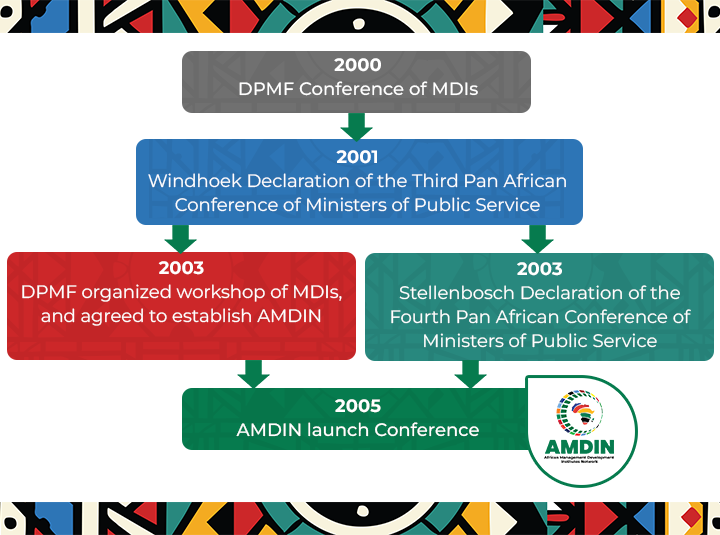In 2000 the Development Policy Management Forum (DPMF)1 initiated a major conference of Management Development Institutes (MDIs)/Public Administration Institutes (PAIs) to discuss the challenges facing MDIs in the light of major problems facing African governments as a result of the intensification of globalisation and internal conflicts in many countries. The conference decided, among other issues to work towards the establishment of an African Network of MDIs which it was hoped would provide a continental forum for MDIs to begin dealing with the new challenges facing them and African governments. The conference requested DPMF to work towards the creation of the African
Network. The Conference was held within the framework of the New Partnership for Africa’s Development (NEPAD) and the decision to establish the African Network was considered part of the objectives of NEPAD.

This has resonated in multiple forums including that of the African Ministers of Public Service. The Windhoek Declaration of the 3rd Pan African Ministers of Public Service on 5 February 2001 highlightedthe centrality and importance of revitalising governance and public administration through strengthening the capacity of state institutions (see Annexure 1). The Declaration approved a Pan-African Governance and Public Administration Capacity Development Programme. The programme serves as a vehicle to mobilise global and continental partners and facilitate the establishment of the required continental and regional interventions to support national governance and public administration improvement efforts. The Windhoek Declaration reaffirmed the crucial role played by the national public administration schools and institutes and the need to develop and strengthen their ability to prepare the public servants of the future to deal with the challenges of globalisation.
Between 2001 and 2003, DPMF organised annual conferences/workshops during which important decisions were taken towards the establishment of the African Network. In 2003, the DPMF organised a workshop of MDIs, and agreed to establish the African Management Development Institutes Network (AMDIN) and to be launched in 2004. The workshop discussed and approved a strategic plan for AMDIN and requested the South African Management Development Institute (SAMDI)2 and the Ethiopian Civil Service College (ECSC) to prepare papers on research and consultancy and curriculum to be presented at the launch of AMDIN. Central to the strategic plan for the establishment and functioning of AMDIN adopted at the DPMF organised workshop, of potential Network participants, in Ethiopia in December 2003 was that the vision and mission of AMDIN should be the Network’s aspiration to contribute to development and poverty reduction in Africa. A Pan-African Governance and Public Administration capacity development programme, as approved by African Ministers of Public Service, was also adopted by the Workshop (see Annexure 4).
The 4th Pan African Conference (2003), through the Stellenbosch Declaration (see Annexure 7), carried this commitment forward as a continental partnership programme on Governance and Public Administration, to be championed and implemented under the NEPAD Capacity Development Programme, was agreed upon. In this programme, the obligation for the development of supportive interventions directed at MDIs and others aimed at mobilising them to ensure their active participation in the programme is clearly stated. In pursuance of this, at the 4th Pan African Conference, a commitment was made by the Development Policy Management Forum (DPMF) to champion the mobilisation of MDIs in order to begin to advocate for more collective action and leveraging in terms of their activities (see Annexure 5).
Hence, AMDIN was conceived against the backdrop of the importance the 3rd Pan African Conference of Ministers of Public Service attributed to MDIs and the need to develop and strengthen the ability of these institutions in order for them to prepare public servants across Africa that can deal with the challenges of the continent within the context of globalisation. To bring AMDIN into existence, an Interim Executive Committee (IEC) was elected and charged to prepare a Constitution for AMDIN to present it at the launch. The IEC’s first meeting was held at DPMF after the Workshop. The Committee decided to ask DPMF to continue facilitating the launch of AMDIN in December 2004 or early 2005. After consultations, DPMF, on behalf of the IEC, asked SAMDI to undertake the task of facilitating the launch of AMDIN in South Africa by end of 2004 or in 2005 (see Annexure 4).
Accordingly, the launching Conference (see Annexure 2) of AMDIN was convened at the Sandton International Convention Centre, Johannesburg, the Republic of South Africa from the 25th to 26th August 2005. The two-day meeting to establish AMDIN was the result of a major initiative of the Development Policy Management Forum (DPMF), the Management Development Institutes (MDIs) with the support of the African Union Secretariat (AU) and the New Partnership for Africa’s Development Secretariat (NEPAD). The initiative was under the guidance and authority of the Committee of African Ministers of Public Service/Civil Service and the will of the MDIs. Given that AMDIN intends to implement the African Ministers of Public Services approved Pan-African Programme Governance and Public Administration and that this programme and other AMDIN activities are part of NEPAD’s objectives, the launch of AMDIN became a collaborative activity with NEPAD and the South African Ministry of Public Service.
The launch symbolised a significant turning point in the prospects for MDIs to collectively re-position themselves, in terms of further aligning their programmatic orientation and efforts to the capability challenges and constraints facing African States’ contexts. Furthermore, the establishment of AMDIN enhances the possibilities for harnessing and leveraging resources and MDI capabilities, as it provides a platform for better co-ordination, deliberate knowledge exchange and indeed, a common vision for the priorities and approaches of MDIs. Two substantive and key outcomes of the launch were the adoption of a Constitution and the election of a Council. In addition, through an initial meeting of the Council, necessity for an urgent follow-up meeting was agreed upon, in order to finalise the AMDIN strategy and establishment plan.
- Development Policy Management Forum (DPMF) is an independent Pan-African non-governmental civil society organisation based in Addis Ababa and hosted at the United Nations Economic Commission for Africa (UNECA). Its founding and present Executive Director is Professor Abdalla Bujra.
- The South African Management Development Institute (SAMDI) is now the National School of Government, South Africa
- AMDIN Launch concept paper- http://amdin.africa/wp-content/uploads/2019/12/AMDIN_launch_concept_paper.pdf
